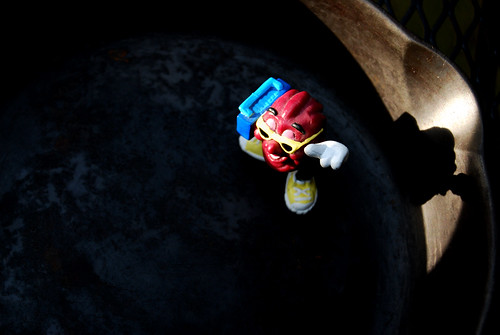
Image : http://www.flickr.com
Cast iron cookware has been with us for hundreds of years and with good reason; it work extremely well, it is inexpensive and once seasoned, it requires very little maintenance. Millions of cooks, whether amateurs or professional; prefer to use cast iron as their cooking tools of preference. You would be hard pressed to find a modern kitchen without at least one cast iron skillet or Dutch oven in their cupboard.
If you love to cook, you definitely need the right tools to be successful and cookware should be categorized as tools. Just as a carpenter needs a hammer and saw, the cook needs the best cookware to achieve great cuisine. Properly cared for cast iron cookware will last for years, as a matter of interest, some people haunt yard sales and antique shops searching for old unusual pieces to restore and cook on once again.
A cast iron utensil needs to be seasoned before it is fit to use. The metal must be coated with a thin layer of protection to prevent food sticking, to eliminate the metallic taste of the raw cast iron and to stop the formation of rust. Most manufacturers tell you to wash the new skillet or pan by hand using hot water and a good brand of dish washing detergent. NEVER put a cast iron utensil in the dishwasher! After washing, rinse and dry thoroughly with a paper towel. I place mine on the stove and heat just enough to drive off all the moisture.
Now is the time to ignore the manufacturer's instructions. Apply a thin coating of grease such as bacon fat or lard. Vegetable oils work but do leave a sticky surface. Some people will recommend food safe mineral oil which should not get tacky; the choice is up to the user. Heat the oven to 450 or 500 degrees and place the pan in the oven upside down over a cookie sheet or some aluminum foil to catch any drips. Bake the pan for at least 1 to 2 hours and let cool. The reason for a higher temperature than what the manufacture recommends is to create a film of carbon on the surface of the pan.
Remember to turn the kitchen exhaust fan on in case it starts to smoke.
To care for the pans, try to clean them when the pan is still fairly hot, Rinse with very hot water from the faucet and scrub with a stiff natural bristled brush. A nylon or plastic bristle brush may melt. Never rinse a red hot cast iron skillet with cold water, it may crack on you. I know because this happened to my favorite griddle.
Never cook at a higher heat than necessary.
Do not use a brand new stainless or copper scrubber or a SOS pad; it will scrape the seasoning off.
If it becomes necessary to wash your cast iron, be brave and do it. Modern dish detergents are primarily wetting agents which when used with a stiff brush will remove the left on grunge, but not the coating. Be sure not to soak the utensil in soapy water. When you are finished, put a few drops of oil on a paper towel and wipe until dry.
Do not store with the lids on, condensation can form cause rusting. If rust occurs, re-seasoning is the only cure.
The more you use your cast iron utensils, the better they will get. The thin layer of carbon you have created will become just like Teflon or Silverstone and require very little oil for cooking.
Chocolate Gold Coins Bassinets and Cradles Back Massagers Reviews
